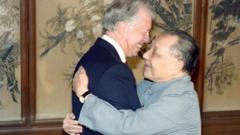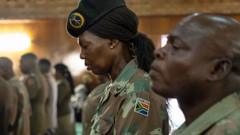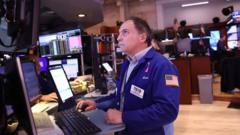The transformative partnership between Jimmy Carter and Deng Xiaoping marked a pivotal moment in US-China relations, setting the stage for China's economic rise while introducing complexities in diplomatic ties. Despite later tensions, Carter's legacy as a champion for engagement with China endures.
Jimmy Carter: Pioneering US-China Relations and His Lasting Legacy

Jimmy Carter: Pioneering US-China Relations and His Lasting Legacy
Reflecting on the transformative relationship between Jimmy Carter and Deng Xiaoping, exploring how their partnership reshaped global dynamics and influenced history.
On a crisp morning in January 1979, a historical moment unfolded as then US President Jimmy Carter welcomed Deng Xiaoping to Washington, making him the first leader of Communist China to visit the United States. This visit marked the dawn of a diplomatic relationship that would change the course of history, heralding China's economic transformation and its emerging rivalry with the US. Carter's establishment of formal ties with China became one of his most remarkable legacies during a presidency defined by challenges.
Carter, born on October 1, shared a birthday with the founding of the People's Republic of China, framing his connection to the country as one of destiny. Following his presidency, Carter devoted effort to maintaining a bond with the Chinese people, an initiative complicated by the fluctuations in US-China relations over the years. His contributions were recognized in statements from Chinese officials, with profound gratitude expressed for Carter as a "driving force" behind the 1979 diplomatic agreement. Some citizens even affectionately referred to him as "Meirenzong," or the "benevolent American."
Carter's initial encounter with China occurred in 1949 when he served as a naval officer amidst the tumult of the Chinese Civil War, positioning him for a uniquely personal connection to Deng. Previous administrations, notably Richard Nixon's, established groundwork for better relations, but it was during Carter's tenure that significant advances were made through secret negotiations leading up to the groundbreaking December 1978 announcement to formally recognize each other.
This historic shift posed a challenging dilemma regarding Taiwan, a long-time US ally. The recognition of Beijing marked the US acceptance of One China, leading to further complicated dynamics concerning US commitments to allies. Yet historians regard this 1979 pivot as a significant turning point that not only united the US and China against the Soviet Union but also spurred unprecedented economic growth in East Asia.
Carter's rapport with Deng was critical for the success of this diplomatic endeavor. Their mutual respect and straightforward personalities fostered a sense of trust that propelled negotiations forward. After his visit to the US, Deng revealed a warm connection to the country, relishing the chance to engage with American culture during his trip, which included a notable photo opportunity during a visit to a Texan rodeo.
The trade relations established under Carter’s administration were robust, as China received "most favoured nation" status, contributing significantly to its economic evolution. In the years following, American and Chinese trade soared, signaling a vital shift in global economic partnerships.
Carter's engagement with China persisted long after leaving office as he conducted humanitarian efforts through the Carter Center, promoting grassroots democracy in rural areas and aiding local elections. His humility resonated with many, garnering him enduring admiration from the Chinese populace.
However, the relationship shifted under Xi Jinping's administration, leading to a gradual cooling of ties. Carter expressed anguish over disheartening diplomatic interactions and the perceived decline of respect within the relationship. Yet, he maintained a vision of a peaceful future, urging current leaders to strive for unity between the US and China, citing a shared destiny that remains crucial in global dynamics today.
The legacy left by Jimmy Carter is complex yet profound, embodying a pivotal era in international relations that brought transformative change for millions and left an indelible mark on how nations engage with each other amid shifting geopolitical landscapes.






















